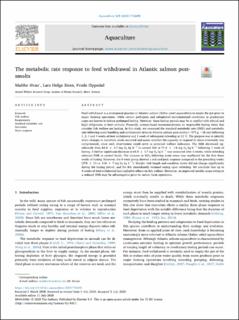| dc.description.abstract | Feed withdrawal is a widespread practice in Atlantic salmon (Salmo salar) aquaculture to empty the gut prior to major farming operations, while certain pathogens and suboptimal environmental conditions in production cages are known to induce prolonged fasting. However, these fasting periods may be in conflict with ethical and legal obligations to farm animals. Presently, science-based recommendations on responsible fasting times that consider fish welfare are lacking. In this study, we measured the standard metabolic rate (SMR) and metabolic rate following acute handling and confinement stress in Atlantic salmon post smolts (~575 g, ~38 cm) following 1, 2, 3 and 4 weeks of feed withdrawal and 1 week of subsequent refeeding at 12 °C. The purpose was to identify when changes in metabolic mode occurred and assess whether the capacity to respond to stress eventually was compromised, since such observations could serve as potential welfare indicators. The SMR decreased significantly from 84.4 ± 4.7 mg O2 kg h−1 in control fish to 71.0 ± 1.8 mg O2 kg h−1 following 1 week of fasting. A further significant decrease to 65.0 ± 3.7 mg O2 kg h−1 was measured after 3 weeks, while refeeding returned SMR to control levels. The increase in MO2 following acute stress was unaffected for the first three weeks of fasting. However, the 4 week group showed a reduced peak response compared to the preceding weeks (278 ± 13 vs. 310 ± 7 mg O2 kg h−1). Weight, fork length and condition factor did not change significantly during the fasting period, and the fish immediately resumed eating upon refeeding. We conclude that up to 4 weeks of feed withdrawal had negligible effects on fish welfare. Moreover, an improved aerobic scope owing to a reduced SMR may be advantageous prior to certain farm operations. | en_US |
